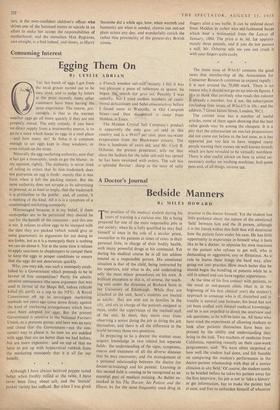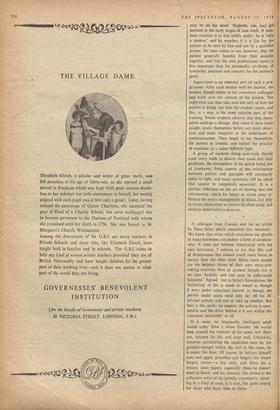A Doctor's Journal
Bedside Manners
By MILES HOWARD
THE position of the medical student during his years of training is a curious one. He is being prepared for one of the most responsible jobs in our society; when he is fully qualified he may find himself at once in the role of a secular priest, counsellor to his patients at times of crisis in their personal lives, in charge of their bodily health, with many powerful drugs at his command. Yet during his medical course he is all too seldom treated as a responsible person. His emotional situation is that of the child, being instructed by his superiors, told what to do, and undertaking only the most minor procedures on his own. A brilliant exception to this is, of course, the teach- ing unit under the direction of Richard Scott in the University of Edinburgh. While they are attached to the unit, Scott's studefits are treated as adults : they are sent out to families in the city, and are in charge of the patients assigned to them, under the supervision of the medical staff of the unit. In short, they move over from observing a senior doing the job to doing the job themselves, and there is all the difference in the world between those two positions.
In preparing to be a doctor the student must acquire knowledge in two related but separate fields: the understanding of the signs, symptoms, course and treatment of all the diverse diseases that he may encounter; and the management of a personal relationship between the doctor (or doctor-in-training) and his patient. Learning in this second field is coming to be recognised as an essential part of medical training. As Balint re- marked in his The Doctor, his Patient and the Illness, by far the most frequently used drug in practice is the doctor himself. Yet the student has little-guidance about the nature of the emotional 'field' between him and the ill person, although it is the forces within this field that will determine how the patient fares under his care. He has little opportunity to experience in himself what it feels like to be a doctor, to appraise his own reactions to the patient who refuses to get well, who is demanding or aggressive, coy or flirtatious. As a rule he learns these things the hard way, after going out into practice. How much better that he should begin the handling of patients while he is still in school and can have regular supervision.
At the time of his first contact with patients, in the ward or out-patient clinic (that is, at the beginning of his first clinical year) the student's approach to someone who is ill, disturbed and in trouble is natural and humane; his head has not yet been stuffed with formal medical knowledge, and he is not impelled to direct the interview and ask questions, as he wilt be later on. All those who have tried the experiment of allowing students to look after patients themselves have been im- pressed by the ability and understanding they bring to the task. Two teachers a medicine from California, reporting recently on their case-work programmes, said: 'We were often surprised at how well the student had done, and felt humble on comparing the student's performance in the doctor-patient relationship with that of a novice clinician in any field.' Of course, the student needs to be briefed before he takes his patient away for the first interview; his job is not to 'take a history' or get information, but to make the patient feel at ease, and free to unburden himself of whatever may be on his mind. Students, too, may get anxious in the early stages of case-work. A com- mon reaction is to feel mildly guilty; he is 'only a student,' and he wonders if it is fair for the patient to be seen by him and not by a qualified doctor. He soon comes to see, however, that the patient generally benefits from their sessions together, and that his own professional status is less important than his personality attributes of sympathy, patience and concern for the patient's good.
Supervision is an essential part of such a pro- gramme. After each session with his patient, the student should return to his consultant colleague and work over the content of the session. The supervisor can then take note not only of how the patient is doing, but how the student reacts; and this, in a way, is 'the most valuable part of the training. Senior students observe that they. them- selves undergo a change: they come to have more insight, know themselves better, are more obser- vant and more receptive to the undertones of communication. They begin to see themselves,, the patient in trouble, and indeed the practice of medicine, in a rather different light.
A grOup of students doing case-work should meet every week to discuss their cases and their problems, the atmosphere of the group being one of frankness; fresh aspects of the relationship between, patient an4 therapist will constantly come to light, and many. questions will be asked that cannot be completely answered. It is a curious reflection on the art of healing that this relationship, which for better or worse must fluence the entire management of illness, has only in recent times come to receive the close study ani analytic observation it deserves.
A colleague from Canada sent me an article by Hans Selye which contained this comment : 'We know that stress which stimulates our glands to make hormones can induce a kind of drunken- ness. A man can become intoxicated with his own hormones. I venture to say thit this sort of drunkenness has caused much more harm to society than the other kind. Many more people are the helpless slaves of their own stress-pro- voking activities than of alcohol. Simple rest is no cure. Activity and rest must be judiciously balanced.' Agreed : but in Selye's formulation the 'balancing' of life is made to sound as though it were under conscious control, as though the person under stress need only lay off his ill: advised activity and rest or take up another. But here is the catch—he cannot; the activity is com- pulsive and the drive behind it is not within the conscious 'perimeter' at all.
If it were, no reasonably intelligent adult would suffer from a stress disorder. He would look around the contents of his mind, sort them out, balance his life and keep well. Unluckily, however painstaking the inspection may be, the gremlin escapes notice. He isn't in the room, he is under the floor. Of course, he betrays himself now and again, grumbles and fidgets; his owner forgets names—a few only, and those for a reason; loses papers, especially those he doesn't want to finish; and has dreams. The dream is the collective voice of the gremlin community, speak- ing in a kind of code, it is true, but quite clearly for those whO have time to listen.































 Previous page
Previous page